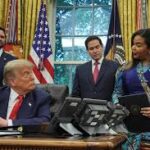In a significant policy change, the United States has announced sweeping revisions to its non-immigrant visa rules for Nigerian citizens. Effective 8 July 2025, nearly all non-diplomatic and non-immigrant visas issued to Nigerians will now be single-entry and valid for only three months, a dramatic shift from the previous long-term multiple-entry visas that spanned two years or more.
The U.S. Department of State says the decision is part of a global visa reciprocity realignment, aligning visa rules to match the conditions set by other countries, including Nigeria, which currently offers U.S. travelers a single-entry, three-month visa.
The announcement comes amid rising speculation about geopolitical motives. Bashir Ahmad, an aide to former Nigerian President Muhammadu Buhari, suggested that the U.S. decision may be more about diplomatic displeasure than simple reciprocity, citing President Bola Tinubu’s recent participation in the BRICS summit in Brazil as a possible trigger. “This appears to reflect growing U.S. discomfort with Nigeria’s increasing global realignment,” Ahmad said on X.
The U.S. government, however, maintains that the changes are in line with efforts to improve visa security standards globally. The revised policy emphasizes stricter requirements for:
- Issuing secure travel documents
- Managing visa overstays
- Sharing security and criminal data for public safety
- Vetting social media activity of applicants for any signs of hostility toward the U.S.
These updates form part of an ongoing review of immigration policies, with future changes likely as diplomatic and security benchmarks evolve.
This move could have a significant impact on Nigerian travelers, students, and business visitors, especially considering that Nigeria is currently the largest African source of international students to the U.S., and the 7th globally, according to the 2024 Open Doors Report published by the U.S. Department of State and the Bureau of Educational and Cultural Affairs. The report also highlighted a 13.5% increase in Nigerian student enrollment from the previous year.
The Nigerian government has yet to officially respond to the announcement, but the visa changes are already generating intense debate among policymakers, travelers, and diaspora communities.
As diplomatic ties between Africa’s largest economy and the world’s largest economy evolve, this latest development marks a pivotal moment in U.S.-Nigeria relations and may influence broader conversations around global mobility, geopolitics, and reciprocal diplomacy.













Leave a comment